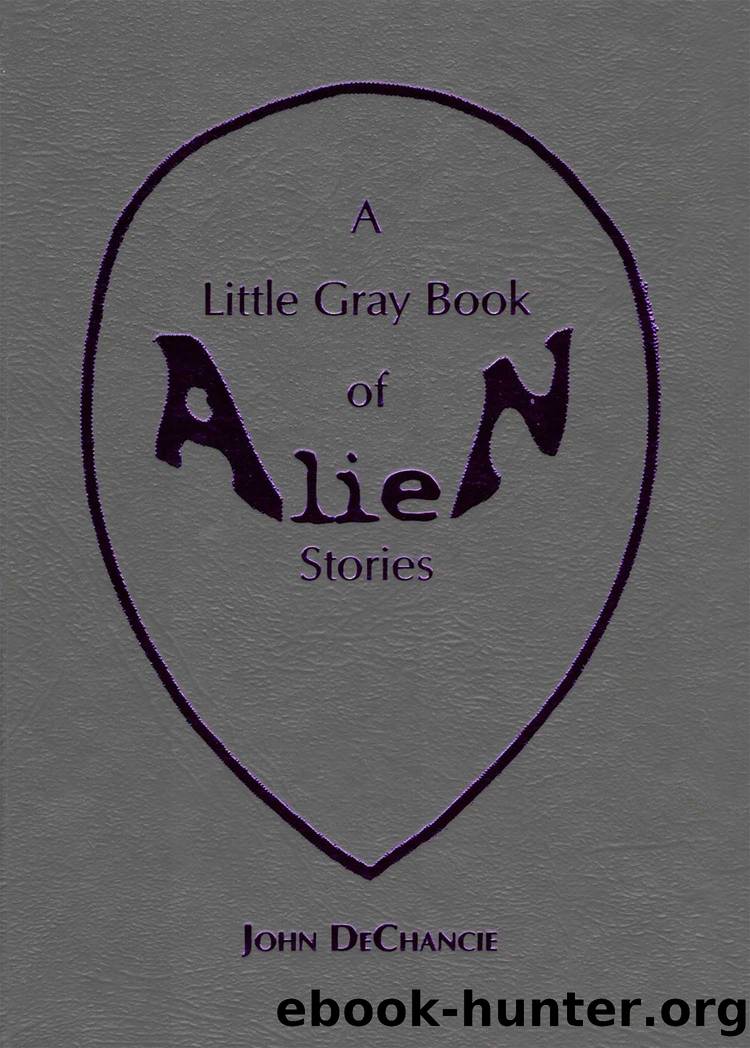A Little Gray Book of Alien Stories by John Dechancie

Author:John Dechancie [DeChancie, John]
Language: eng
Format: epub
Tags: science fiction short stories
Publisher: Crossroad Press
Published: 2021-01-22T00:00:00+00:00
TU QUOQUE
Lunchtime.
Food smells, cafeteria food, the unmistakable effluvium of rancid meat and reheated gravy mixing in the hallways with bathroom disinfectant and the faintest whiff of old vomit dusted up by the janitor long ago. Recess time: from the playground come shouts, taunts, imprecations in sing-song rising on the fall air.
Book dust, old wood. School is an insular sensorium, a self-contained universe of smells, sights, sounds: the feel of fresh, slick textbook paper, the smell of its ink; the waxy odor of crayons and the musty one of pencil shavingsâ¦the slant of afternoon light through rows of classroom windows, birdsong outsideâ
He walks along the hallway, not very afraid of meeting an adult, because he has a hall pass. Forged, but he is a good forger. He should be out on the playground. Who would suspect him of playing hooky from recess? They might ask to look at the slim book heâs carrying, but maybe not. Probably not.
The piano practice room is locked; but he is prepared. A credit cardâhis credit card, fully functional, with a $5000 line of creditâapplied to the crack between door and jamb, and heâs in. The room is dark.
He flips on the light, goes to the piano, a battered console upright with gouges taken out of its faded walnut finish. The keyboard is not locked, and he is glad for that. He sits on the bench and puts the music score up on the rack.
CONCERTO IN A MINOR
FOR PIANO AND ORCHESTRA
Edvard Grieg
Flipping pages, he runs his eyes over the tiers of staves, the various parts: Fagottiâ¦Violinoâ¦Corni⦠Bassoons, strings, horns. He knows Italian and several other languages. The piano solo part is three-quarters of the way down the page. The concerto begins with a tympani crescendo, the piano coming in immediately in a descending series of minor chords.
He puts his fingers to the keys, his long delicate fingers. He can play intervals of a tenth easily. He heard this piece once and fell instantly in love with it.
He plays the first four measures. It sounds like the CD he heard. The arpeggio looks daunting until he plays it. He reads music instantly, easily. He probably could have played this piece by earâhe has perfect pitchâbut he wanted to study the score.
There are many parts. He plays the string parts, then the woodwinds, then the brass. Abstracting, he plays them all together, reducing the harmony to accommodate his short fingers.
He is enjoying himself. He loves music, though most of what he hears coming out of the radio is banal, juvenile, silly, boring. This is different. He likes other sorts of music besides classical, but classical pieces seem to have more going on inside themâstructural things: towers of harmony, dancing counterpoint, long, thoughtful meditations on themesâmore. âSeriousâ music is interesting and a lot of it is actually fun.
He is well into the second movement (Adagio) when the door opens.
It is the math teacher, Mrs. Shaeffer.
âI thought someone was playing the radio in here.â
He looks up at her. He decides to play innocent.
Download
This site does not store any files on its server. We only index and link to content provided by other sites. Please contact the content providers to delete copyright contents if any and email us, we'll remove relevant links or contents immediately.
| Mystery | Thrillers & Suspense |
| Writing |
Spare by Prince Harry The Duke of Sussex(5175)
Machine Learning at Scale with H2O by Gregory Keys | David Whiting(4292)
Never by Ken Follett(3937)
Fairy Tale by Stephen King(3370)
Oathbringer (The Stormlight Archive, Book 3) by Brandon Sanderson(3154)
Reminders of Him: A Novel by Colleen Hoover(3092)
The Man Who Died Twice by Richard Osman(3072)
Will by Will Smith(2908)
Carl's Doomsday Scenario: Dungeon Crawler Carl Book 2 by Matt Dinniman(2824)
Win by Harlan Coben(2655)
Never Lie: An addictive psychological thriller by Freida McFadden(2580)
The Dark Hours by Michael Connelly(2300)
Friends, Lovers, and the Big Terrible Thing by Matthew Perry(2219)
The Becoming by Nora Roberts(2188)
The Stranger in the Lifeboat by Mitch Albom(2113)
Cloud Cuckoo Land by Anthony Doerr(2098)
The Lost Apothecary by Sarah Penner(1874)
A Short History of War by Jeremy Black(1842)
Ellery Queen - 1965 - The Fourth Side of the Triangle by Ellery Queen(1841)
